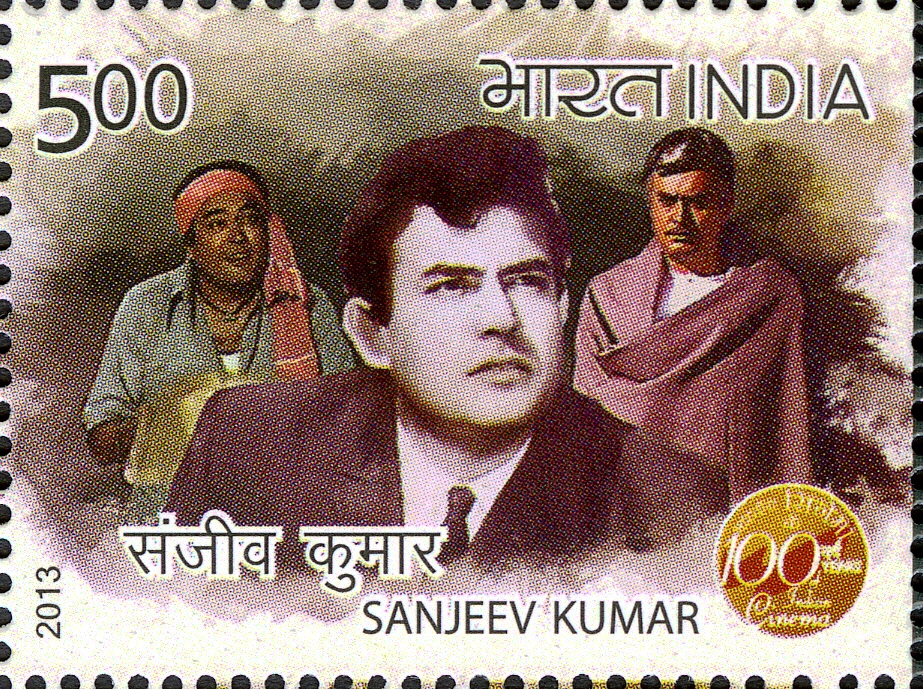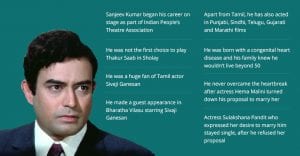
Sanjeev Kumar: An actor who broke moulds, defied rules

July 9, 2019 marks the 81st birth anniversary of Sanjeev Kumar, an actor who has left behind a rich legacy, in a career spanning a little over two decades.
Every now and then, he would have given his fans a harvest of roles and performances that could have gone down the annals of Indian cinema among some of the finest performances. After all, he was a two-time National Award winner who alternated between serious roles and comical ones with equal élan.
The first award was for his performance in Dastak (1971) as a young Muslim man whose life takes a turn soon after he and his wife unwittingly move into a red light area. However, it was Koshish, that released a couple of years later, that he gave the most poignant performance- as a speech and hearing impaired man — who beats all odds to survive and succeed in an insensitive society.
The unlikely hero
Sanjeev Kumar, who was born into a Gujarati family hailing from Surat in 1938 as Harihar Jariwala, had a gradual rise in the industry, following a stint in theatre. Debuting in 1960 in Hum Hindustani, he starred in a number of films like Nishan, Naunihal and Gunehgar, in lead roles. However, it was Khilona (1970) that catapulted him into limelight. Essaying the role of a mentally unstable man who is incarcerated by his own family, he moved the audiences into tears and breezed into their hearts.
Sans glamour or the mannerisms that were typical of the actors of those times — like Shammi Kapoor or Rajesh Khanna — Kumar developed a distinct style of dialogue delivery. The quiver and voice modulation that probably suited most roles he played as an aged man. Possibly, that is what singled him in a group of some evidently handsome actors like Shashi Kapoor, Dharmendra and the ilk that were making a splash on the silver screen around the same time.
After Khilona, he dabbled in both commercial and off beat films. Anubhav (1972), Manchali (1973), Anamika (1974), etc went hand in hand with Seeta Aur Geeta (1972), Naya Din Nayi Raat (1974), the Hindi remake of Sivaji Ganesan starrer Navarathri, in nine different roles.
Versatility was his forte
If you were to think of one best performance of Sanjeev Kumar, you would never be able to stop with one. As a rabid fan of his, I am often divided between Koshish and Mausam—both helmed by the remarkable Gulzar, who probably brought the best out of him. One would also be biased towards Anubhav, a black and white flick by Basu Bhattacharya that captured the travails of a married couple that endures rocky terrains to discover their love for each other. Playing an aloof and later a jealous husband, his switch from the brooding editor to a romantic, it was a role with many shades and depths. What about Angoor, one many ask. Inspired by Shakespeare’s Comedy of Errors, in which he plays identical twins separated at birth, Sanjeev could not have found a better role to exhibit his versatility.
 His willingness to experiment came through in Satyajit Ray’s Shatranj Ke Khiladi (1977), an adaptation of Munshi Premchand’s short story by the same name. As an obsessed chess player, hooked to his game fleeing from responsibilities, when Awadhi is on the brink of annexation by the British, he is convincing as Mirza Sajjad Ali.
His willingness to experiment came through in Satyajit Ray’s Shatranj Ke Khiladi (1977), an adaptation of Munshi Premchand’s short story by the same name. As an obsessed chess player, hooked to his game fleeing from responsibilities, when Awadhi is on the brink of annexation by the British, he is convincing as Mirza Sajjad Ali.
Having been paired with some of the most iconic and firebrand actresses of those times — Mumtaz, Sharmila Tagore, Suchitra Sen and Jaya Bhaduri Sanjeev could dictate his own space in scripts that had more meat for the woman’s role. In Mausam, in which Tagore plays a double role, unaware that she has fallen for her mother’s lover — he makes a seamless transition from a hopeful and bright doctor to a guilt-ridden aging man, seeking atonement. Namkeen (1982) saw him slipping into the shoes of a truck driver who shirks his duties towards a household filled with women, seeking solace in his wanderings. Coated in the rusticity and the grime and dust the role demanded, he comfortably holds his own amid power-packed actresses like Shabana Azmi and Waheeda Rehman.
Talk about donning the wig and portraying the shades of grey like in Trishul (1976) as the ambitious businessman, who is avenged by his son played by Amitabh Bachchan — he lived a different life in every role he played, and it was with conviction.
On the screen, he had a repertoire of works that could make any of his contemporary envious and in real life, he nursed a broken and a weak heart. For an actor, who played an aged man, it was ironical that he didn’t even live till 50. And in the short stint, he has left behind a treasure trove for film lovers to cherish and celebrate, reminiscing one of the finest actors to have graced Indian cinema.


